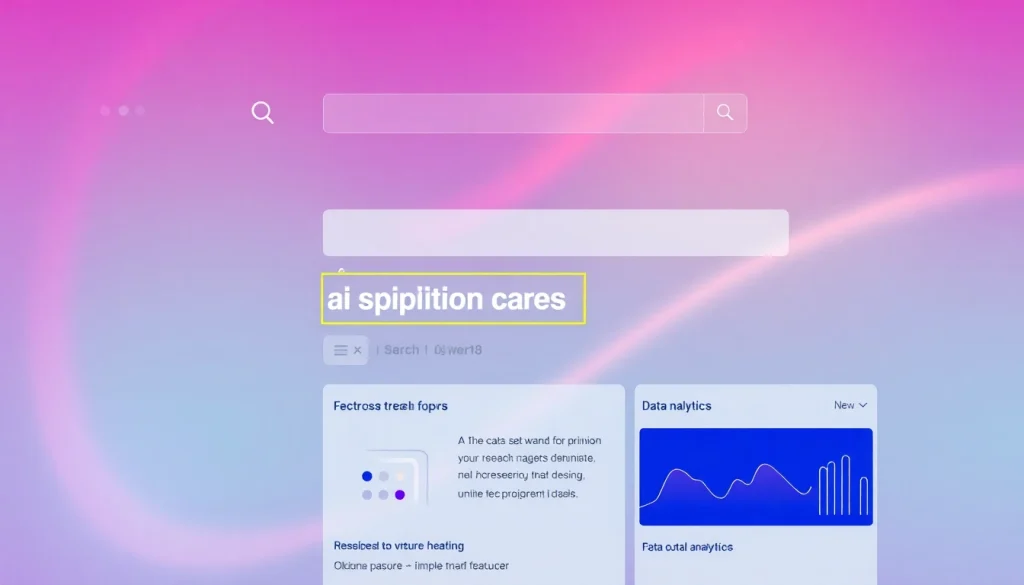Understanding AI Opinion Search
In an era dominated by rapid technological advancements, the way we search for and analyze information has evolved remarkably. Among these innovations, AI Opinion Search stands out as a breakthrough in research methodologies. By integrating artificial intelligence into the search process, it allows users to find nuanced insights, including varying opinions on complex topics. This article delves deep into AI Opinion Search, exploring its definition, evolution, benefits, and much more, ensuring that researchers and academicians have a comprehensive understanding of its capabilities. For further insight, consider exploring more about AI Opinion search.
What is AI Opinion Search?
AI Opinion Search refers to the use of artificial intelligence technologies to locate, interpret, and synthesize differing viewpoints on specific themes or questions found within vast collections of scholarly articles, papers, and other forms of literature. This technology leverages natural language processing (NLP) algorithms to understand context, sentiment, and relevance. Unlike traditional search engines which predominantly retrieve articles based on keywords, AI Opinion Search digs deeper into the content, assessing how varying opinions develop across discussions, debates, and research findings.
The Evolution of Search Technologies
From basic keyword searches to highly sophisticated machine learning algorithms, the evolution of search technologies has greatly impacted how researchers access information. Initially, search engines provided limited capabilities, simply indexing documents and returning results based on keyword frequency. However, as the volume of information online surged, so did the complexity of search technologies. The advent of AI-driven tools heralded a new era, transforming search beyond mere retrieval into a dynamic process of finding and summarizing opinions, assessing relevance, and identifying relationships among concepts.
AI Opinion Search is positioned at the forefront of this evolution, utilizing machine learning to improve search accuracy and relevance. Tools like Consensus, Semantic Scholar, and Scite showcase how AI can enhance research by focusing not just on what is said, but on how different voices and opinions articulate scholarly discourse.
Benefits of Using AI in Research
The integration of AI in research comes with an array of benefits, enhancing both efficiency and depth of analysis:
- Increased Efficiency: AI tools can sift through massive quantities of data in mere seconds, providing researchers with a curated list of the most relevant resources.
- Diverse Perspectives: These tools can aggregate differing viewpoints from across the literature, fostering a more well-rounded understanding of a topic.
- Enhanced Insights: Advanced algorithms can detect trends and nuances in opinions that might be missed in a standard search, providing richer insights into scholarly debates.
- Accessibility: AI can enable those outside specific fields to grasp complex ideas through simplified summaries, making research more accessible.
Key Features of AI Opinion Search Tools
Natural Language Processing
Natural Language Processing (NLP) is the cornerstone of AI Opinion Search. NLP algorithms enable computers to understand, interpret, and generate human language in a valuable way. This is not merely about matching keywords; rather, it’s about understanding the context surrounding those words. For example, if a user inputs a query about climate change opinions, an NLP-driven tool can distinguish between scientific literature that criticizes, supports, or discusses the implications of climate policies.
Real-Time Data Insights
Real-time insights are crucial for researchers who rely on the latest studies and developments. AI Opinion Search tools can offer instant access to the newest publications and prevailing debates, empowering users to stay informed. Automated alerts and updates can also notify users of new publications in their area of interest, thereby streamlining ongoing research efforts.
User-Friendly Interfaces
Despite their advanced capabilities, AI Opinion Search tools are designed with user experience in mind. Intuitive interfaces allow users, regardless of technical expertise, to navigate and harness the power of AI in their search endeavors. Features such as voice search, filters for opinion types, and visual data representations enhance engagement and make research more interactive.
How to Implement AI Opinion Search in Your Research
Setting Up Your AI Opinion Search
Implementing AI Opinion Search tools in your research workflow can be straightforward. Here’s a step-by-step guide:
- Select a Tool: Choose a suitable AI Opinion Search platform, such as Consensus, Semantic Scholar, or Scite based on your needs.
- Create an Account: Most platforms require users to create an account for personalized features.
- Input Your Query: Formulate clear and concise searches, specifying the opinions or viewpoints you’re interested in.
- Use Filters: Apply filters such as publication date, document type, or opinion type to refine results.
- Analyze Results: Review the findings, paying attention to the summary insights and differing perspectives provided by the AI.
Best Practices for Effective Searches
To maximize the effectiveness of AI Opinion Search, consider these best practices:
- Be Specific: Use specific queries that encapsulate the core of the opinion you are seeking. Adding context improves the relevance of results.
- Utilize Advanced Features: Make use of sorting options and filters to drill down into specific categories relevant to your query.
- Regularly Update Searches: As new research unfolds, revisiting your searches can reveal updated opinions and insights that were previously unavailable.
- Engage with the Community: Many platforms offer community features where users can discuss findings, which can further enrich understanding and insight.
Common Challenges and Solutions
While AI Opinion Search offers numerous advantages, users may encounter challenges, such as:
- Information Overload: The vast amount of data can sometimes overwhelm users. Solution: Prioritize specific questions or themes to maintain focus.
- Variability in Quality: The quality of studies and opinions can vary. Solution: Cross-check findings with additional reputable sources for validation.
- Cognitive Bias: Personal biases might affect how researchers interpret findings. Solution: Actively seek diverse perspectives to challenge pre-existing beliefs.
Comparative Analysis of AI Opinion Search Platforms
Consensus vs. Semantic Scholar
Consensus and Semantic Scholar represent two innovative approaches in the AI Opinion Search landscape. Consensus focuses on aggregating scholarly opinions from a variety of sources, providing a comprehensive look at debates on specific topics. Semantic Scholar, on the other hand, excels in its ability to highlight key phrases, citations, and influential papers, leveraging its understanding of semantics. While both platforms have unique strengths, the choice depends on the user’s specific needs: whether they prioritize comprehensiveness or depth of analysis.
Scite vs. Elicit: A Closer Look
Scite and Elicit offer distinct functionalities tailored towards different stages of research. Scite emphasizes citation context, allowing users to see how papers support or refute other research, offering a more nuanced view of literature relationships. Conversely, Elicit functions as an AI research assistant, enabling users to draft summaries and extract essential information efficiently. This contextual intelligence can streamline data acquisition and synthesis, which is fundamental during preliminary research phases.
Choosing the Right Platform for Your Needs
Selecting the right AI Opinion Search platform is essential and should align with individual research goals. Consider the following factors:
- Specificity of Research Area: Some platforms specialize in certain fields, significantly enhancing their effectiveness.
- User Experience: Evaluate if the platform’s interface and features are intuitive and match your technical comfort level.
- Cost: While some platforms offer free versions, others operate on subscriptions. Assess your budget versus the required features.
Future Trends in AI Opinion Search
Emerging Technologies to Watch
The landscape of AI Opinion Search is rapidly evolving. Future trends will likely encompass:
- Integration with Augmented Reality: Augmented reality might bring search results to life, allowing users to interact with data visualizations in immersive ways.
- Greater Personalization: AI systems will become increasingly adept at tailoring results based on individual research styles and preferences.
- Enhanced Collaboration Tools: Platforms may evolve to incorporate collaborative features where multiple researchers can work on shared queries and viewpoints.
Anticipated Changes in User Behavior
As AI Opinion Search tools become more sophisticated, user behaviors will also shift. We can expect:
- Increased Reliance on AI: Researchers will lean more on AI tools for preliminary insights, thereby saving time and focusing on deeper analyses.
- Revival of Interdisciplinary Research: As AI can pull in data from diverse fields, interdisciplinary research will likely flourish, leading to innovative insights and solutions.
- Rapid Adaptation to New Technologies: Users will need to stay agile, continuously learning to leverage new functionalities within AI Opinion Search platforms.
The Role of AI in Academic Research Evolution
The role of AI in academic research is undeniable. As these technologies advance, they will redefine how knowledge is constructed, disseminated, and critiqued. The synthesis of diverse viewpoints enables richer academic dialogues and fosters informed discussions around societal issues, innovation, and strategy. Ultimately, AI Opinion Search serves not just as a tool but as a crucial partner in the quest for knowledge.





